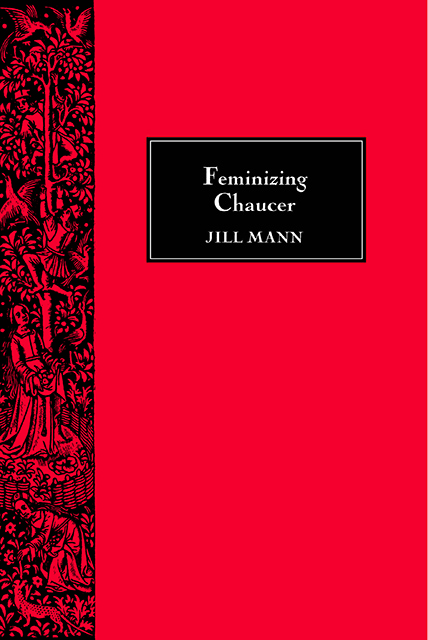Book contents
- Frontmatter
- Contents
- Dedication
- Preface to the 2002 Edition
- Preface
- Abbreviations
- Introduction
- 1 Women and Betrayal
- 2 Antifeminism
- 3 The Surrender of Maistrye
- 4 Suffering Woman, Suffering God
- 5 The Feminized Hero
- Conclusion
- Excursus: Wife-Swapping in Medieval Literature
- Chaucer Studies
- Bibliography
- Index
2 - Antifeminism
Published online by Cambridge University Press: 17 March 2023
- Frontmatter
- Contents
- Dedication
- Preface to the 2002 Edition
- Preface
- Abbreviations
- Introduction
- 1 Women and Betrayal
- 2 Antifeminism
- 3 The Surrender of Maistrye
- 4 Suffering Woman, Suffering God
- 5 The Feminized Hero
- Conclusion
- Excursus: Wife-Swapping in Medieval Literature
- Chaucer Studies
- Bibliography
- Index
Summary
Who peyntede the leon, tel me who?’
(Wife of Bath's Prologue 692)And yet, and yet. The Legend of Good Women can be no more than a provisional response to antifeminism, contradicting but not obliterating it. Created as antifeminism's mirror-image, it derives the very substance of its being from its antagonist's power, and relies on that power to justify its own extremism. There thus arises the danger acutely described by Elaine Showalter:
The [feminist] critique … has a tendency to naturalise women's victimisation, by making it the inevitable and obsessive topic of discussion …
This comes dangerously close to a celebration of the opportunities of victimisation, the seduction of betrayal. (1979, 28) The focus on victimisation in the Legend carries not only this risk, but also the risk of stasis: the polarisation of male treachery and female suffering immobilizes not only the women in the legends, but also the poetic discourse itself, perennially arrested by pity. In the Canterbury Tales, Chaucer solves this problem by setting both antifeminism and ‘wommanly pitee’ within dynamic structures that enable him to go beyond the old stereotyped polarities even while acknowledging their powerful grip on human lives. And the first step is to turn away from the mirror-image to engage directly with antifeminism itself. This direct engagement is apparent above all in the Merchant's Tale and the Wife of Bath's Prologue, which will form the focus of attention in this chapter.
For Chaucer, the éminence grise behind the medieval tradition of antifeminist literature was St Jerome, whose treatise Against Jovinian offered a rich stock of materials on which misogynist writings throughout the Middle Ages drew. Jerome's work is a polemic directed against ‘a certain Jovinian’, who had (among various other heretical arguments) denied that virginity was a state superior to marriage. Women are thus not the primary target of the polemic, but are as it were civilian casualties sacrificed to Jerome's saturation bombing. Thus, since Jovinian had instanced the much-married Solomon in support of his case, Jerome replies by quoting antifeminist proverbs from the Solomonic books of the Bible as ‘evidence’ of what Solomon's experience of women had taught him: (for example) ‘It is better to dwell in a corner of the housetop, than with a brawling woman in a wide house [Prov. 21:9]’ (Adv. Jov. I.28).
- Type
- Chapter
- Information
- Feminizing Chaucer , pp. 39 - 69Publisher: Boydell & BrewerPrint publication year: 2002

